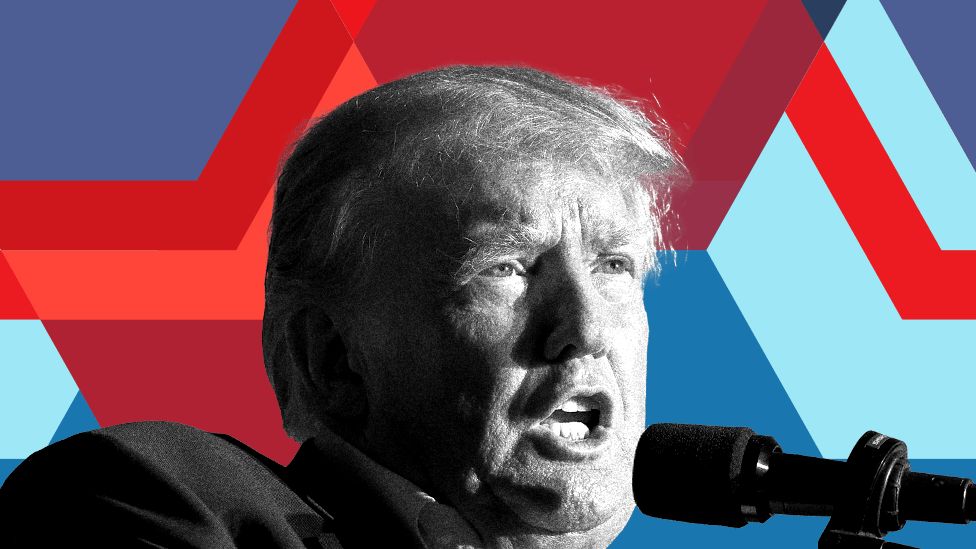ARTICLE AD BOX

By Bernd Debusmann Jr
BBC News, Washington
Donald Trump has hinted he is likely to run for president again - but he probably won't announce until after next week's congressional elections. So what does he want to happen in the midterms?
These elections will show to what extent the Republican Party has become what former President Donald Trump's son Eric has repeatedly termed "the Trump Party".
"He literally brought in a whole new party that stands for something totally different than the wider class of the Republican Party ever stood for," Eric Trump told conservative TV network Newsmax.
But what Mr Trump wants and what the wider party wants are not always aligned.
He has endorsed dozens of candidates for Congress as well as others running in governor races and for state legislatures.
While he's not on the ballot, many political observers see the midterms as a litmus test of his influence within the party and of his electoral viability ahead of a potential presidential bid in 2024.
Will Trump's endorsements succeed?
In the Republican primary contests - where they elected the party's candidates to take on the Democrats - 221 of candidates Mr Trump personally endorsed won their race, compared to just 20 losses.
That's an 89% success record, although experts have said some of these candidates were already likely to win.
For Mr Trump, the success of his favoured candidates may allow him to better gauge the level of influence he has over voters.
"One of the measures of political clout is the ability to endorse candidates, and whether or not they win," John Hudak, a senior fellow at the Washington DC-based Brookings Institution who researches campaigns and elections, told the BBC.
Mr Hudak added that while victories could help him in the future, the midterms could also mark a "double edged sword" for Mr Trump.
"If his endorsed candidates lose, it could raise questions about his political acumen," he said.
Doug Heye, a former Republican National Committee spokesman, questioned how successful the Trump endorsements really were.
The president did not spend much on their campaigns, Mr Heye said, and his appearances amounted to a "grievance tour" more focused on himself than the candidates.
Image source, Getty Images
Image caption,Pennsylvania Senate candidate Dr Mehmet Oz is among the politicians that have a Trump endorsement
A helping hand for 2024
Historically, races for secretary of state - a position that helps administer elections - have been largely ignored by the US public.
But they've now become the focus of intense national attention, particularly as some Republican nominees for these positions - such as Arizona's Mark Finchem and Michigan's Kristina Karamo - have repeated Mr Trump's unproven claims that the 2020 election was illegitimate.
Some have warned that the election of Trump allies to these positions could help him in the event he tries to run for the presidency again in 2024.
"Winning these would be helpful in the case of a disputed election," explained Matt Lacombe, an American politics professor at Case Western Reserve University in Ohio.
"Having allies, whether in national or subnational office is helpful to his political future, assuming he wants it."
Mr Heye also expressed concern that Trump-aligned secretaries of state could potentially "overturn free and fair election results" in his own favour.
No more Capitol riot hearings
A more immediate benefit for Mr Trump would come from a Republican-controlled house, a midterms outcome now considered likely by most political analysts.
If that happens, the House committee investigating the 6 January 2021 riot at the US Capitol - which recently issued a legal summons ordering Mr Trump to testify - could be dismantled.
Mr Trump has repeatedly sought to portray the committee as a ruse designed to distract voters from the "disaster" of Democratic governance ahead of the midterms.
Image source, Getty Images
Image caption,A Republican-controlled House is likely to disband the committee investigating the 6 January riot
"That'll probably be dismantled," said Grant Reeher, a political science professor at Syracuse University. "He'll claim that vindicates him."
House Republicans have also reportedly discussed launching their own investigations if they regain a majority, including into the 6 January committee itself or on the Biden administration.
When will he announce a run?
So far, Mr Trump hasn't officially announced his intention to run for president in 2024.
But at a rally in Iowa on 3 November he dropped the strongest hint yet that he plans to do so. He told a crowd of thousands that "in order to make our country very successful and safe and glorious, I will very, very, very probably do it again".
"Get ready - that's all I'm telling you," he added, speaking over the applause of the crowd. "Very soon."
Citing unnamed sources in the Trump camp, several US outlets including Axios and the New York Times later reported that the announcement could come as soon as 14 November.
That is the same day the congressional committee investigating Mr Trump's alleged involvement in last year's Capitol riot has ordered him to appear for a deposition.
While he's expected to take credit if the Republicans perform well in the elections, some experts have speculated that he may run regardless of how his candidates do. Close or contested elections in particular could end up helping shore up support from his base amid continued claims that he was robbed of a win in 2020.
"If his candidates lose, he'll claim the elections were stolen," Mr Hudak said. "That could bolster him."
Trump: The Comeback? Katty Kay explores the state of US democracy

 2 years ago
40
2 years ago
40








 English (US) ·
English (US) ·